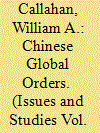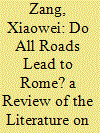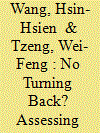|
|
|
Sort Order |
|
|
|
Items / Page
|
|
|
|
|
|
|
| Srl | Item |
| 1 |
ID:
193138


|
|
|
|
|
| Summary/Abstract |
While many use rational IR theory to explain Chinese foreign policy behavior, this paper follows global IR to employ interpretivist theory to examine how Chinese elites understand their country’s role in the world. In particular, it explores the Chinese global order ideas of socialism, tradition, and nation through a comparative analysis of how they work in China–Russia relations, especially after China’s 20th Communist Party Congress in 2022. The first section presents a critical analysis of the realist understanding of the China–Russia–U.S. strategic triangle. It argues that the socialist concept of “united front work” better explains Chinese (and Russian) policy in terms of short-term “tactical triangles.” To probe China’s long-term global order ideas, the second section explores narratives of tradition to examine the concentric circles model of global order seen in Chinese tianxia and Russian Eurasianism. To understand these competing Russocentric and Sinocentric global orders, the third section explores how each country’s official historiography highlights narratives of the nation and especially how national rejuvenation requires correcting the “national humiliation” of lost territories. Rather than see these narratives in a linear chronological history — i.e., from tradition to socialism to nationalism — this paper considers how they overlap in socialism, tradition, and nation, a non-linear dynamic triad of global order ideas. It concludes first that further research is necessary to examine the interrelation of these three narratives: while nation and tradition are often employed to support the overarching narrative of socialism in recent years, this could certainly change. The conclusion then argues that while these narratives may be coherent theoretically, they have not been very successful in achieving Beijing and Moscow’s foreign policy objectives.
|
|
|
|
|
|
|
|
|
|
|
|
|
|
|
|
| 2 |
ID:
193140


|
|
|
|
|
| Summary/Abstract |
Political elites have a tremendous influence on past, present and future socioeconomic and political developments in both western and non-western countries. Unsurprisingly, the analysis of China’s elites has been crucial in the study of politics there. A large body of literature has examined the members of the Central Committee of the Chinese Communist Party, a stronghold of the nation’s political elites. Given the growing interest and research on elite politics in the PRC in recent years, this paper reviews studies of the pathways to political power and the personal qualifications of the members of the Central Committee that are central to studies of elite Chinese politics. This review paper is organized both chronologically and thematically. It shows a shift away from the study of demographics of Central Committee members toward theorizing of how recruitment into the Central Committee works. Some scholars have theorized succession politics in China as the rise of technocracy, while others have used institutionalization and factional politics to explain how China’s leaders are selected. This paper summarizes and identifies several theoretical and methodological issues in existing studies as an effort to advance research on succession politics and political evolution in China.
|
|
|
|
|
|
|
|
|
|
|
|
|
|
|
|
| 3 |
ID:
193139


|
|
|
|
|
| Summary/Abstract |
This paper collects and analyzes the speeches of top Chinese leaders on Taiwan, the relevant remarks of Taiwan-related ministries and commissions, and important documents concerning Taiwan. It takes the visit of U.S. House Speaker Nancy Pelosi to Taiwan as an example to observe China’s current policy toward Taiwan and its intent to employ force. This paper argues that although the outside world has repeatedly emphasized that “Taiwan is the most dangerous place on earth” and that China will invade Taiwan by force, peaceful unification is still the main axis of its strategy toward Taiwan. Military force is an avenue for China to force unification and prevent international interference in the Taiwan issue. The results of our analysis of Taiwan-related remarks by top Chinese leaders and relevant ministries and commissions are also highly consistent with the political report of the 20th Party Congress, and there are two noteworthy points. First, China has linked “opposing independence” with “opposing interference by external forces” and the principle of “never renouncing the right to use force over Taiwan.” From Beijing’s perspective, the Taiwan issue is no longer one simply involving cross-strait relations but is embedded in China’s domestic national rejuvenation and the strategic competition between itself and the United States. Moreover, Xi Jinping is the most critical factor affecting cross–strait relations. As a strong leader with a historic mission, how Xi regards the Taiwan issue will affect both the destiny of Taiwan and the security of the entire Asia-Pacific region.
|
|
|
|
|
|
|
|
|
|
|
|
|
|
|
|
| 4 |
ID:
193137


|
|
|
|
|
| Summary/Abstract |
The 20th National Congress of the Chinese Communist Party (CCP) in October 2022 secured Xi Jinping’s third term as General Secretary and secured a team of supporters amid socioeconomic woes and increasingly hostile global circumstances. While leadership matters in all political systems, it matters much more in totalitarian and authoritarian ones. Political leaders in democracies are constrained by electoral cycles, term limits, and approval ratings, but the leaders of the PRC’s single-party system that emphasizes discipline, hierarchy, and democratic centralism operate relatively unchecked by bureaucracy, opposition forces, or public opinion. Its leaders possess the ultimate decision-making authority in national security and strategic policies (Zhao, 2022, p. 5).
|
|
|
|
|
|
|
|
|
|
|
|
|
|
|
|
|
|
|
|
|